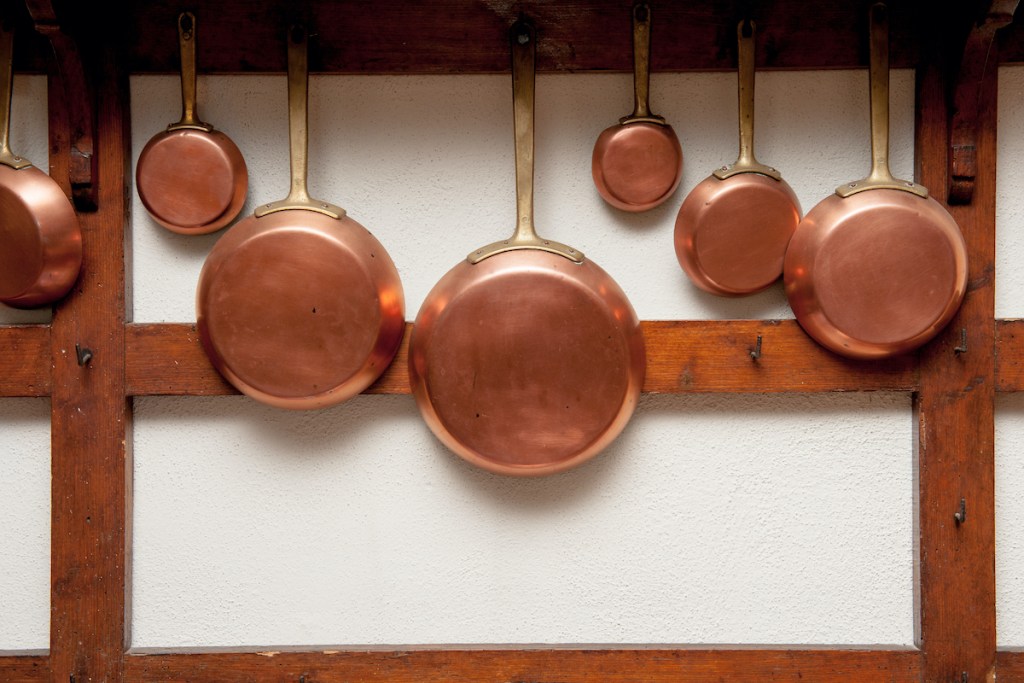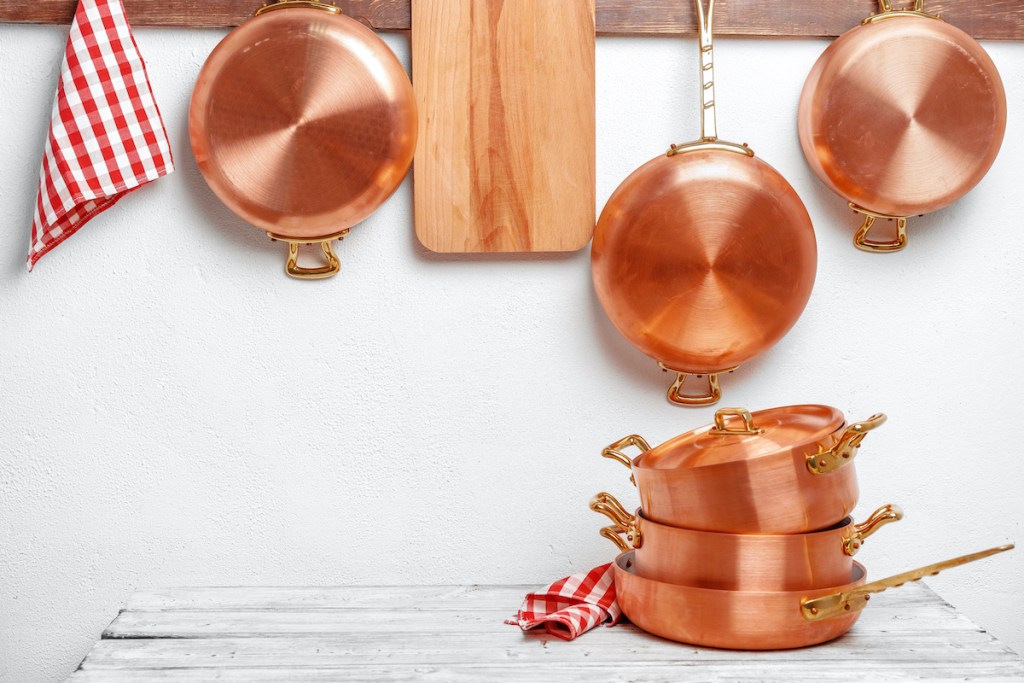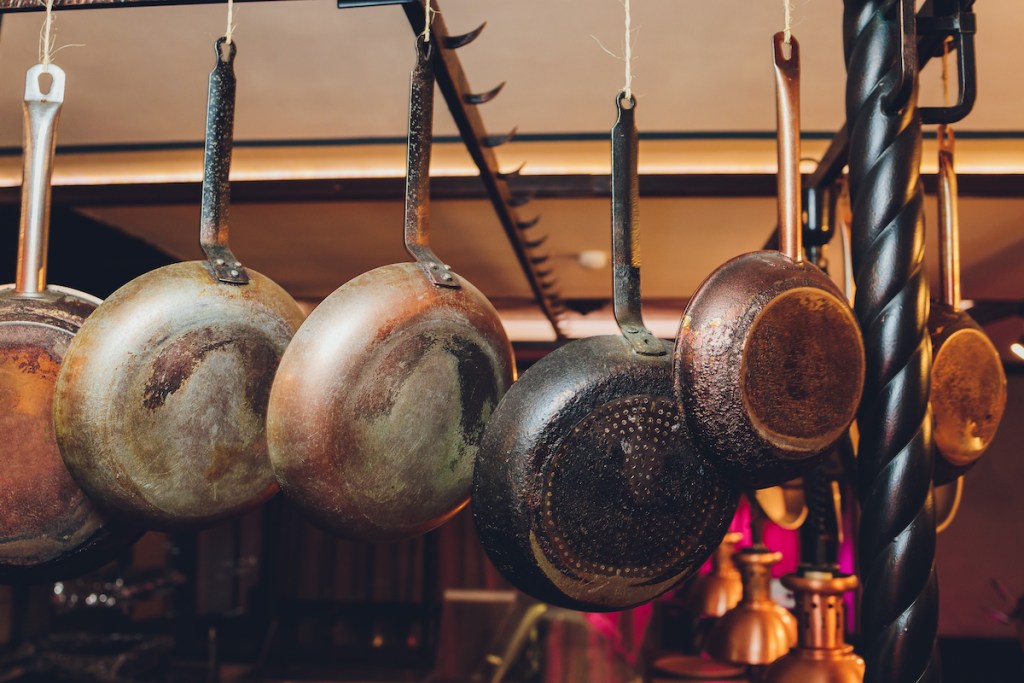If you do a lot of cooking at home (and who doesn’t these days?), you may be in the market for new cookware. There are the usual suspects in cookware, including stainless steel, cast iron, enamel, and steel, but copper cookware is one that many professional and home cooks covet. Copper pots and pans have a lot of pros, including their stunning appearance.
But are they worth the investment? We’ve done the research to give you the pros and cons, cost, and cooking components so you can decide if copper cookware is the right choice for what you cook the most.

What are the pros of copper cookware?
According to a recent Consumer Reports study, “Real copper cookware provides quick and even cooking, and cools down quickly, providing maximum control.” They recommend looking for heavy-gauge copper to withstand the test of time.
Copper cookware is versatile
There’s not much you can’t cook using copper. It stands up to extremely high heat, so you can sear meat, sauté, and fry foods like chicken and anything that needs to be flash-fried to your heart’s content. Copper offers superior conductivity (that’s why it’s used in electrical wiring), so it reacts quickly to changing temperatures and can heat and cool with more precision than other metals. It gives you control over cooking like no other metal.
Copper cookware is visually appealing
But the biggest benefit of copper cookware may just be how it looks. Its gorgeous color and design mean it can go directly from the stovetop or oven to the dining room table, offering all the “wow factor” you need for presentation.

What are some cons of copper cookware?
- Expense: The biggest drawback of copper cookware is the price tag. Just one pot usually starts around the $100 mark, but the average is closer to $300.
- Easily damaged: Copper can also dent easily, so you need to use extreme care when using and storing copper pots and pans. You also want to be careful when selecting utensils that won’t scratch the inside of the cookware. The good news is that if you take good care of it, copper cookware can be passed down through generations.
- Requires lining: Because copper is a reactive metal, you want to buy ones that are lined with a non-reactive metal (like tin), so they are safe to cook in.
- Shouldn’t be used for certain foods: Another consideration is the type of food you cook. The FDA recommends avoiding using copper with foods below a pH of 6.0 (any food with high acidity).
- Requires handwashing: Copper pots can never be cleaned in a dishwasher, so you have to be committed to handwashing and polishing them regularly. If not, they can oxidize and take on a patina look over time.

Is copper cookware worth the investment?
If you’re serious about cooking (or want to become the next great home chef), there is nothing quite like copper. It’s expensive because it cooks like no other material and offers precision when cooking, so you can heat and cool quickly. If you’re just getting into cooking and want to get your hands dirty with both food and cookware, we suggest starting with stainless steel or enamel cookware. That way, you can get the feel of how to cook different foods at various temperatures before investing in copper. It is the most expensive cookware on the market, so you really want to be sure you’re committed to its care and use before you buy.
Because copper heats and cools so quickly, it’s ideal for delicate foods like fish and seafood and cooks sauces like a dream (think anything with cream or cooking chocolate). Once a copper pot is removed from its heat source, it cools rapidly. This means overcooking or breakage of sauces is minimal. If you are buying copper cookware, do your homework and make sure it’s lined with an appropriate metal that won’t allow copper to leak into the food being cooked in it.
Aside from its lining, the other thing you want to watch out for is the thickness of the pot or pan. It needs to be 2.5 to 3 mm thick or else it will start to lose its conductivity and response to heat. You can buy copper cookware from most online retailers or go the classic route and buy from Mauviel and De Buyer. It will be an investment, but like any investment, it can pay off for generations — just think of all the family cooks who will enjoy it with passed-down recipes. Rest assured that cooking with copper will never be a disappointment.



